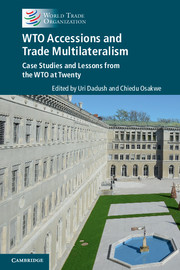Book contents
- Frontmatter
- Dedication
- Contents
- List of contributors
- Foreword
- Acknowledgements
- List of abbreviations
- Editors' note
- PART I WTO accessions, the trading system and the global economy
- PART II Overview: systemic outcomes from accessions
- PART III Members’ perspectives on accession negotiations
- Original members
- Article XII members
- 16 The 2001 WTO accession of China: negotiating experience – challenges, opportunities and post-accession approaches
- 17 The 2001 WTO accession of the Separate Customs Territory of Taiwan, Penghu, Kinmen and Matsu: negotiating experience – challenges, opportunities and approaches post-accession
- 18 The 2004 WTO accession of Cambodia: negotiating priorities and experience – growth and integration eleven years later
- 19 The 2008 WTO accession of Ukraine: negotiating experience – challenges, opportunities and post-accession approaches
- 20 The year 2012: WTO accession of Montenegro – why did we apply to join? Priorities and results
- 21 The 2012 WTO accession of Russia: negotiating experience – challenges, opportunities and post-accession approaches
- 22 The 2013 WTO accession of Lao PDR: specific commitments and the integration of least-developed countries into the global economy
- 23 The 2013 WTO accession of Tajikistan: experience of a landlocked economy in a changing regional economic configuration
- 24 The 2014 WTO accession of Yemen: accession negotiations as an instrument for domestic reform, national security and international cooperation
- PART IV Working party chairpersons’ perspectives on accession negotiations
- PART V Salient features inWTOAccession Protocols
- PART VI Conclusion
- Annex: Contributor biographies
- Index
- Plate section
23 - The 2013 WTO accession of Tajikistan: experience of a landlocked economy in a changing regional economic configuration
from Article XII members
Published online by Cambridge University Press: 05 November 2015
- Frontmatter
- Dedication
- Contents
- List of contributors
- Foreword
- Acknowledgements
- List of abbreviations
- Editors' note
- PART I WTO accessions, the trading system and the global economy
- PART II Overview: systemic outcomes from accessions
- PART III Members’ perspectives on accession negotiations
- Original members
- Article XII members
- 16 The 2001 WTO accession of China: negotiating experience – challenges, opportunities and post-accession approaches
- 17 The 2001 WTO accession of the Separate Customs Territory of Taiwan, Penghu, Kinmen and Matsu: negotiating experience – challenges, opportunities and approaches post-accession
- 18 The 2004 WTO accession of Cambodia: negotiating priorities and experience – growth and integration eleven years later
- 19 The 2008 WTO accession of Ukraine: negotiating experience – challenges, opportunities and post-accession approaches
- 20 The year 2012: WTO accession of Montenegro – why did we apply to join? Priorities and results
- 21 The 2012 WTO accession of Russia: negotiating experience – challenges, opportunities and post-accession approaches
- 22 The 2013 WTO accession of Lao PDR: specific commitments and the integration of least-developed countries into the global economy
- 23 The 2013 WTO accession of Tajikistan: experience of a landlocked economy in a changing regional economic configuration
- 24 The 2014 WTO accession of Yemen: accession negotiations as an instrument for domestic reform, national security and international cooperation
- PART IV Working party chairpersons’ perspectives on accession negotiations
- PART V Salient features inWTOAccession Protocols
- PART VI Conclusion
- Annex: Contributor biographies
- Index
- Plate section
Summary
ABSTRACT
Tajikistan was part of the Great Silk Road, a system of caravan routes connecting Eurasian countries between the second century BC and the fifteenth century AD. The development of trade throughout Central Asia encouraged the people of this region to adapt to the demands and requirements of consumers thousands of kilometres away, both in western Europe and in China. Tajikistan's principal rationale for seeking WTO membership was to gain access to new markets and secure the General Agreement on Tariffs and Trade/WTO right of freedom of transit, reinserting Tajikistan into trading routes, comparable to its location in the historic Great Silk Road system. By becoming a member of the WTO in 2013, Tajikistan is opening up new markets for its goods, just as it did several centuries ago. Tajikistan sought WTO membership to sustain domestic reforms. Domestic reforms entailed enactment, repeal and/or amendment of approximately one hundred laws and regulations. In the experience of Tajikistan, successful negotiating factors included, inter alia, a technically competent negotiation team, support from WTO members, strategically defined negotiating objectives, accompanied by a strategy for cooperation. Post-accession considerations should be part of an accession strategy. This chapter outlines Tajikistan's road to the WTO.
Territorial restrictions, lack of access to the seas, remoteness and isolation from world markets, and consequent high transit and transport costs remain an essential barrier to the social and economic development of Tajikistan. Countries without access to the sea are usually among the poorest countries of the world, with a low level of development. Sixteen out of thirty landlocked countries are least-developed countries (LDCs).
The high costs of transporting goods which landlocked countries must cover are much more significant barriers to trade than import tariffs applicable to such goods entering their markets. Emerging economies and landlocked countries pay three times more in transport costs than in applicable import tariffs. According to research conducted by Venables and Limão (2001), expenses for 1,000 kilometres of shipping by sea reach about US$190, while the same distance by land would cost US$1,380, which is 7.3 times higher than the cost of transportation by sea.
The political situation in the south, civil war in the recent past and complex relations with neighbouring countries are additional factors directly affecting the development of the country.
- Type
- Chapter
- Information
- WTO Accessions and Trade MultilateralismCase Studies and Lessons from the WTO at Twenty, pp. 558 - 567Publisher: Cambridge University PressPrint publication year: 2015



